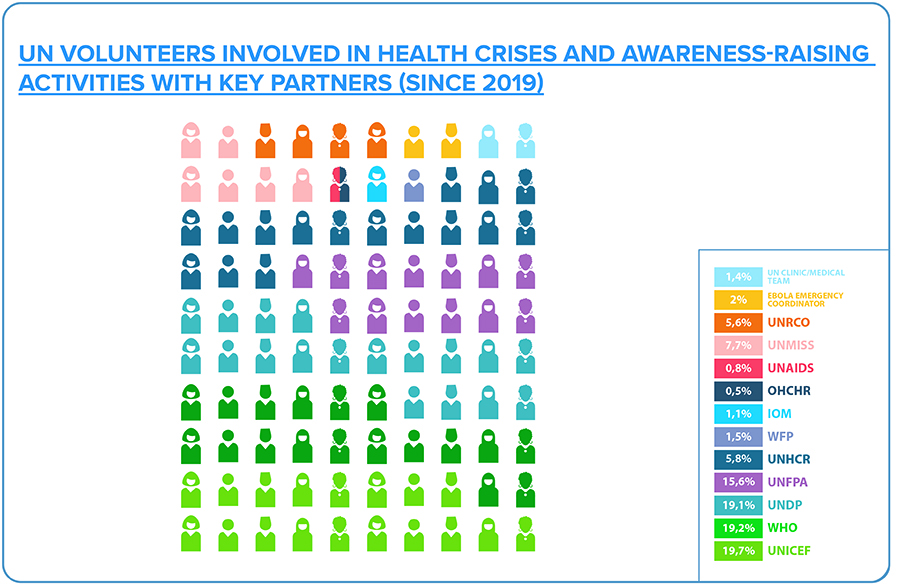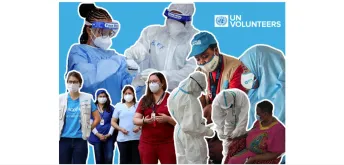Through the years, UN Volunteers have been on the frontlines of global health crisis campaigns worldwide. This wealth of experience makes UN Volunteers ready to support vaccine rollout campaigns, as part of the COVID-19 response.
Now a year into the pandemic, global health matters have become the most important issue facing peace and development worldwide. Indeed, as a part of the 2030 Agenda for sustainable development, good health and wellbeing are crucial not only for those in need, but also for a more prosperous and sustainable world.
"No country will be safe from COVID-19 until all countries are safe." --UN Secretary-General António Guterres
In achieving better health for all, throughout the last few decades, hundreds of UN Volunteers have played an essential role in health emergencies. They have not only been deployed as medical personnel, but also in awareness campaigns on health issues.
The below historic examples of the active participation of UN Volunteers in supporting health emergencies show how these rich experiences can be useful to the next level of health emergency preparedness, such as on-going vaccination practices and the COVAX roll-out.
Global health legacy
UNV has a legacy of responding to health crises. Working collaboratively with UNAIDS, UN Volunteers have been working towards stopping HIV/AIDS infections and ensuring access to necessary treatment. Since 2016, UN Volunteers have worked with the UN Joint Programme in Uzbekistan in the Aral Sea region, to spread information about preventive measures for communicable diseases resulting from ecological changes.
Another example is from Cox’s Bazar, Bangladesh, where UN Volunteers are working with the vulnerable refugee population. So far, many UN Volunteers have supported sanitation and hygiene awareness, which has led to protecting 150,000 children against measles and polio and 700,000 people against cholera.
In Pakistan, 157 UN Volunteers conducted a large-scale measles vaccination campaign with the World Health Organization (WHO). By engaging national UN Volunteers who have a strong understanding of the language, community dynamics and cultural awareness in the vaccination campaign, WHO was able to have deep reach among the households across the country and vaccinated more than 37 million children – which translated into a success rate of 94 per cent.
During the first Ebola crisis in West Africa, UN Volunteers were deployed to support the coordinated UN system Ebola response, especially in the three most affected countries — Guinea, Liberia and Sierra Leone. By providing medical and logistics assistance, 250 UN Volunteers, including 130 international volunteers, supported the operations of the UN Mission for Ebola Emergency Response (UNMEER).
Most recently, with the lessons learned from previous health emergencies response, UN Volunteers have been deployed to overcome the health, economic and social impacts of the global Coronavirus pandemic. Since last March, 1,046 UN Volunteers have been supporting the COVID-19 response with 26 UN partner entities.[1]
UN Volunteers during health crisis and awareness-raising campaigns
As previously seen, UN Volunteers have responded to various health emergencies. Since 2019, 3,045 UN Volunteers were deployed by UN entities in five regions – Arab States, Asia and the Pacific, East and Southern Africa, Europe and the CIS, Latin America and the Caribbean and West and Central Africa — working to raise health awareness during COVID-19 and other health emergencies.[2] Along with medical and logistics assistance, UN Volunteers raised awareness by spreading verified information, educate communities by refuting misinformation and find innovative ways to reach the unreached.
For instance, 990 UN Volunteers were deployed as health officers and played a pivotal role in responding to health emergencies with their medical profession and knowledge. On the other hand, 1,119 UN Volunteers served as communication/programme officers and helped raise awareness of the necessary hygiene practices and preventive measures.
Additionally, 416 UN Volunteers were deployed on information/knowledge management and technology assignments to combat the health crisis with innovative management tools. Including 520 UN Volunteers who also served in other areas during health crises, UN Volunteers have created successful outcomes with their unceasing efforts.

Behind these numbers are the real human stories of UN Volunteers working in community engagement in response to COVID-19. In the Arab States, UN Volunteers serving with WHO are working tirelessly to support the massive outreach and awareness raising efforts in the region, as part of preventive measures against the pandemic.
In Liberia, community volunteers with Volunteers without Borders, UNDP, IOM and UNHCR, are reaching out to communities and introducing information that can help curtail the COVID-19 virus.
Similar work is going on in Asia and the Pacific. Notably in Nepal, UN Volunteers with the V4Action project are combating misinformation and myths by reaching out to people and sharing verified information through infographics, photos and videos.
In some regions, changes are being made to the way volunteers respond amid the coronavirus pandemic. In South Sudan, for example, UN Volunteers with UNMISS have discovered radio broadcasts as a way to engage with inaccessible populations and locations. Similar to this approach, 15 thousand young volunteers in Peru were deployed to support the first massive digital volunteering campaign. They were in charge of calling seniors every day, and from this, volunteers could track health conditions and create early alerts to ensure necessary treatment for everyone.
In Karakalpakstan, Uzbekistan, 400 medical workers, teachers, community mobilization specialists and health volunteers trained by UNV organized remote consultations for villages. Based on a previous volunteer mobilization scheme which evolved thanks to the UN Joint Programme on the Aral Sea region, it kept community members safe 24/7 using Telegram and calls.
Indeed, with a diverse and highly skilled talent pool, some having already served in other health crises, UN Volunteers are ready to hit the ground running for vaccination campaigns and the next phase of COVID-19 response. The experiences of UN Volunteers and the contribution that they can make during acute crises provide partners with an opportunity to increase engagement for enhanced response and recovery.
Further information
UNV’s network of field units and regional offices are ready to support UN Volunteer recruitment for COVAX rollout; check out our COVAX offers and regional contacts here.
More information on the UNV COVID-19 offer is available on the dedicated page on UNV’s COVID-19 pandemic response.
[1] This number (lasted updated on February 16, 2021) comes from a narrower category of volunteers who contributed to certain COVID-19 related assignments. For more up-to-date information, please access UNV’s COVID-19 pandemic response.
[2] In this part, we focused more on the general roles that UN Volunteers served, specifically for assignments that are related to awareness-raising campaigns during health crisis in the past few years. Therefore, data here includes not only the number of volunteers who were deployed for COVID-19 related assignments, but also those who served in general health emergency response, such as the Ebola crisis, HIV/AIDS and malaria, among others.

